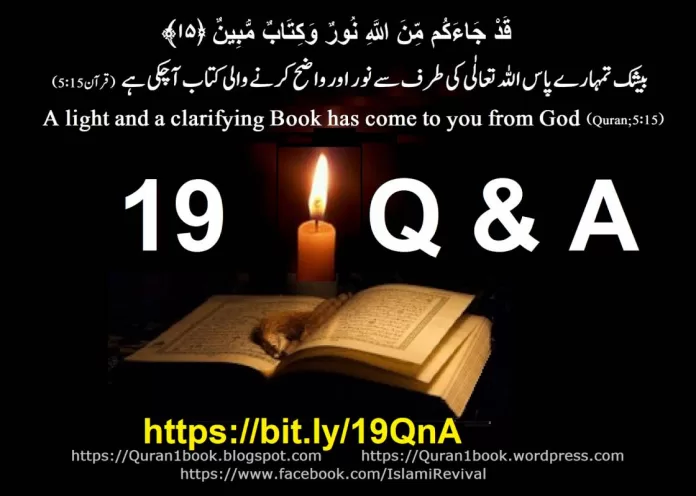Introduction
The ongoing discourse surrounding Islam in contemporary times has revealed numerous discrepancies as diverse religious authorities strive to define the permissible and prohibited aspects in Islam. As a consequence, religious communities often find themselves growing increasingly distant from the foundational scripture the Quran, constructing ethical frameworks and principles based on a myriad of supplementary sources. While the Sunnah, Hadith, and the invaluable contributions of distinguished scholars undoubtedly serve to elucidate and elaborate on the fundamental principles encapsulated in the Quran, it is crucial to acknowledge that the Quran, which is Furqan[1] (Criteria, Discernment), alone stands as the immutable cornerstone embodying the definitive guidelines of the perfected Deen Islam.
Islam is a religion that transcends cultural and geographical boundaries, encompassing people from all walks of life. The Quran, as the sacred scripture of Islam and its teachings hold a universal and timeless significance. Although the Quran was revealed in seventh-century Arabia, its teachings are not confined to that particular time and place. Rather, they are meant to be applied to all times and places.
The Quran’s universal nature lies in its ability to address the inherent nature and needs of humanity across different periods and cultures. Its teachings provide guidance on matters of faith, morality, ethics, social interactions, and all aspects of personal conduct. The principles and values outlined in the Quran are applicable to people of all backgrounds, regardless of their cultural or geographical context.
Prophet Muhammad (Pbuh) indeed serves as an exemplary role model for Muslims to emulate, regardless of their cultural or historical context. His actions and behavior provide practical demonstrations of how to implement the guidance of the Quran in everyday life. However, it is important to note that Islam does not require strict adherence to the specific cultural practices or traditions of 7th century Arabia. Islam is a comprehensive and dynamic religion that recognizes the evolution of societies and the advancements in human knowledge and technology over time. While the Prophet Muhammad’s (Pbuh) confirmed actions and teachings provide valuable guidance, it is not imperative to replicate the cultural practices of that era if they are not essential to the core principles of Islam. For example, the use of clay tablets for personal hygiene (“istinja”) in 7th century Arabia was a practical solution given the available resources at that time. However, Islam does not mandate its followers to exclusively follow that practice in contemporary times. Islam allows for flexibility and adaptation to different cultural norms and advancements in human civilization, as long as they do not contradict the core principles and teachings of the faith.[2]
Islam through Quran:
In the current era, Muslims often have questions regarding various aspect in their faith and acts about which they feel shy to talk or discuss. It is essential for Muslims to actively engage with the Quran by reading, understanding, and practicing its teachings. Unfortunately, over time, some Muslims have relegated the Quran to the level of just a revered book that is merely recited and placed on a shelf. To foster progress and growth, it is imperative to change this mindset. Therefore, 19 answers to address some common questions that Muslims may have, aiming to foster a deeper understanding and practical application of the Quran in their lives are presented below. (Number 19 has weird significance to the author [3]). These answers serve as a starting point for embarking on a meaningful journey of faith, enabling individuals to delve into the beauty and wisdom of Islamic teachings. By exploring these answers, Muslims can start to gain insights, find clarity, and strengthen their connection with the Quran, ultimately enriching their spiritual journey of faith and relationship with Allah. To draw maximum benefit and remain engaged with the Quran, please visit the links/ references of verses given here and also explore the relevant verses at website[4] with multiple translations to broaden the vision.
- The Quran is perfect, complete, eternal guidance for humanity which cannot be abrogated, eternal, unambiguously explains everything, neglects nothing, this blessed book must be followed to receive mercy ( 6:115, 6:34, 2:185,, 10:64,18:27, 18:1-2, 16:89, 17:9, 6:155). The Quran contains everything that we need for guidance (16:89). God did not leave anything (6:38).
- The Master Key to Quran verse 3:7:
He is the One Who has revealed to you ˹O Prophet˺ the Book, of which some verses are precise (آيَاتٌ مُّحْكَمَاتٌ)—they are the foundation of the Book—while others are elusive[5], (with multiple meanings). Those with deviant hearts follow the elusive verses seeking ˹to spread˺ doubt through their ˹false˺ interpretations—but none grasps their ˹full˺ meaning except Allah. As for those well-grounded in knowledge, they say, “We believe in this ˹Quran˺—it is all from our Lord.” But none will be mindful ˹of this˺ except people of reason. (3:7)[6]

- Beliefs, doctrines, works, and opinions that lack a foundation in precise Quranic verses (آيَاتٌ مُّحْكَمَاتٌ) are deemed unacceptable by Quran. Consequently, it is not difficult to envision the fate of doctrines, beliefs, works, actions and sects that rely on other books[7], works, and interpretations by ‘learned individuals’. The only book given and recommended by Allah and the Prophet (Pbuh) is the Quran.(20:123)
- God revealed the Quran to Muhammad (Pbuh) Messenger of Allah and the last Prophet (Pbuh) (27:6, 33:40, 48:29). The only book that the Messenger delivered to the world is the Quran (6:19). The mission of the Messenger is to deliver the message (16:35-36).The Quran is preserved in a master record and is free from ambiguity, protected by Allah, Falsehood cannot approach it (85:21-22; 18:1-2, 15:9, 41:42).
- It is the book of God, without any doubt, guidance for those who fear God, verifying old scriptures, and guarding over them (5:48, 2:2). The Quran is fully detailed, not vague (30:28; 41:3). The Quran has been explained and detailed by God Himself (11:1; 75:19). God is the teacher of the Quran (55:1).
- A book of warning, made easy to learn, Criterion to judge right and wrong (6:19,54:17, 25:1). The Quran is a source of guidance, mercy, and good news for Muslims (16:89). The Quran is Arabic (12:2)[8]. [The translation facilitates understanding but translation is not Quran because the translators may add different meanings according to their comprehension, bias or beliefs. Hence the translation must be checked with the original Arabic text of the Quran.][9]
- It has been delivered by the Messenger without alteration, enumerated in numbers (72:28, 5:67). The Quran is the truth, a balance, and judges between people (42:17; 2:213). People not satisfied with the Quran, want to amend it with other books (10:15).
- It is a book with no hidden information, but people have deserted it (3:187, 25:30). Divine revelation and signs should not be ignored, and seeking expert advice is encouraged (25:73, 16:43).
- Intelligence, reason[10], and historical precedents should be used to understand and carry out God’s commands, and information should be critically evaluated (7:179,12:111, 3:137, 17:36). The worst of creatures are the deaf and dumb people who do not use intellect (8:22). God throws filth (misguidance) on those who don’t use intellect (10:100). Riba (Usury) is prohibited but original capital protected (2:279) (Hence through intelligent application of this command, resolve the issue in paper currency era).
- Open-mindedness, freedom of expression, and critical reading are promoted (39:18, 10:36, 66, 53:28, 96:1-5, 55:1-4). Focusing on the main point and holding judgment when lacking sufficient information are advised (2:67-71, 5:101-102, 22:67, 20:114)
- It has clear proofs for pondering, serves as a reminder and contains prophecies (16:44, 74:1-37; 27:82-84; 44:10:15; 54:1-6; 2:26; 18:9-27; 25:4-6; 10:20; 41:53; 38:1-12). The Quran should be studied, pondered over, and deeply contemplated (2:121; 38:29; 47:24).
- Concealing its revelations brings the curse of Allah, disputing its verses leads astray, and denying it results in a dreadful doom (2:159, 2:174; 40:69; 45:11). The Quran cannot be replicated by humans and jinn (17:88).
- The written numerical structure, divine laws, examples for mankind and guardians of hell fire are to strengthen faith of believers and trial for others. (83:9, 20;10:38; 17:89, 74:24-31)[11]
- It brings healing and mercy to the believers, leads people out of darkness into light, and serves as Furqan (17:82; 14:1; 25:1).
- Those who disbelieve in the Quran are doomed, and only the wrongdoers deny its Ayat, don’t be who hear, and don’t obey (90:19; 29:49, 8:21).
- Allah is “Al-Salaam” (59:23), He chose ‘Islam’ as the name for the perfected religion (5:3) Muslims is the eternal name of believers (22:78), Sects have nothing to do with Islam (6:159, 3:103)[12]. He has not laid upon you any hardship in religion; the faith of your father Ibrahim; He named you Muslims before and in this, Abraham was a good example for us (22:78; 2:135; 60:4). All religious practices; daily prayers, obligatory charity, fasting, and pilgrimage come through Abraham (21:73; 2:43,127‐128; 2:183; 3:43; 19:31‐59; 20:14). Those who decree religious laws never authorized by God, and their followers, are idol worshipers (42:21).
- Obey Allah and the Messenger (3:31-32, 24:56). The Messenger of Allah is a good example to follow (33:21). Therefore thoroughly, check accuracy and truthfulness of information presented on name of the Prophet (Pbuh), use intellect, reason (49:6, 8:22) and guidelines provided[13]. Don’t be deceived (3:196). Allah says that the Quran is the best Hadith Book, in which Hadith[14] after this will you believe (39:23, 45:6, 77:50, 7:185, 4:87)[15]. The Quran is not a hadith that was invented (hadeethan yuftara) (12:111). If you obey the majority of those on earth they will lead you away from God’s path; that is because they follow conjecture, and that is because they only guess (6:116, see 37:71, 12:103, 10:55, 38:24), (6:112-116; 11:1; 31:6; 33:38; 52:34).
- The Quran emphasizes the importance of personal dignity, respect, and confidentiality related to the concept of privacy: Do not enter houses without permission (24:27), Maintain the sanctity of private conversations, avoid sinful discussions, focus on righteousness and piety (58:9), Avoid negative assumptions, do not spy or backbite (49:12). Prophet Muhammad (Pbuh) was known for his modesty, humility, and privacy. He did not openly discuss his personal life, including his sexual activity. Some information about his marriages and family life is known, but it is generally treated with respect and modesty. Some doubtful narrations violate his privacy[16]. The focus should be on his teachings, character, and the principles he conveyed to humanity. His mission was to spread the message of Islam, establish social justice, and guide people towards spiritual and moral excellence. The finer details of his private life need not be discussed unless he himself narrated, which is doubtful. It is important for Muslims to uphold the dignity and respect of the Prophet (Pbuh), focusing on his overall message. wisdom, character, and the profound impact he had on the development of Islam and the Muslim community.
- The terms Prophet and Messenger are not rigid, used synonymously (2:87, 5:44) as well as differently (5:44, 3:39, 6:83-86)(81:19, 2:98) in the Quran, hence it encompasses all. Prophet Muhammad (Pbuh) was the last and final prophet (33:40) and the Quran is the final complete, perfected book (6:115), no one can change its words and Islam, the perfected deen(5:3) with the perfection of book and Deen, the divine revelations have been closed. Any claim to be a prophet or messenger of God is false, against the Quran (3:7, 33:40,2:87, 5:44). Rejection of even one verse of Quran is rejection of the whole book, kufr(2:85)[17]. The complaint of the messenger in the hereafter will be about the desertion, abandonment of the Quran by adherents (25:30).
- Anyone who disobeys Allah and His messenger is a disbeliever (72:23). We have been commanded to follow the Quran alone (7:2‐3; 17:46). (The great disobedience [18] of Quran and Prophet (Pbuh)[19]

Conclusion
ز مَن بر صُوفی و مُلاّ سلامے: کہ پیغامِ خُدا گُفتَند ما را
ولے تاویلِ شاں در حیرت اَنداخت: خُدا و جبرئیلؑ و مصطفیؐ را
Translation: My Salaam (salutations) to Sufi and Mulla for conveying the orders of Allah to us, but the interpretations of those orders surprised Allah, Gabriel and Muhammad (Pbuh) Mustafa (Allama Muhammad Iqbal).
Sectarianism, intolerance, extremism, and takfir are rejected, emphasizing the importance of peaceful dialogue and maintaining the unity of the ummah is important. Muslims should aim to guide one another towards truth, through the Quran, while remaining steadfast in their pursuit of knowledge and righteousness.
“.. Our Lord! Do not punish us if we forget or make a mistake. Our Lord! Do not place a burden on us like the one you placed on those before us. Our Lord! Do not burden us with what we cannot bear. Pardon us, forgive us, and have mercy on us. You are our ˹only˺ Guardian. So grant us victory over the disbelieving people.””[2:286]
References:
https://Quran1book.wordpress.com/19QA
[1] https://www.islamawakened.com/quran/25/1/default.htm
[2] https://salaamone.com/intellect/
[3] https://salaamone.com/9teens/
[4] https://www.islamawakened.com/index.php/qur-an
[5] Why did Allah keep ‘elusive’ verses in the Quran? Its trial and majority seems to have failed in this trial, hence the Messenger (Pbuh) will complain to Allah that his people had abandoned Quran (25:30)/ https://www.islamawakened.com/quran/3/7/default.htm
[6] Foundation, The Master Key to Quran (3:7) شاه کلید قرآن https://bit.ly/Key2Quran https://corpus.quran.com/translation.jsp?chapter=3&verse=7
[7] ‘Hadith Book Ban’ https://wp.me/scyQCZ-ban01 / https://wp.me/scyQCZ-list, (Tirmidhi: 2906, Mishkat:185)
[8] Quran is in Arabic, translation facilitates understanding but translation is not Quran, the translators may add differing meanings according to their beliefs. Hence the translation must be checked with the original Arabic Quran. An example is word Hadith, well known since time of Prophet (Pbuh) and understood by all, why translate it? If there is a different meaning, it can be understood from context. Do we translate the word ‘Quran’ as “recitation”?
[9] Websites with Word by word and multiple translations: https://corpus.quran.com/ https://www.islamawakened.com/ over 60 translations.
[10] Quran on Intellect: https://salaamone.com/intellect / https://salaamone.com/riba/
Ethics https://salaamone.com/ethics/
[11] https://pressthat.files.wordpress.com/2007/06/19.pdf / https://www.islamawakened.com/quran/74/31/default.htm
[12] https://SalaamOne.com/muslim1 / Bida’h: https://wp.me/scyQCZ-bidah / http://salaamone.com/muslim-only/
[13] https://quran1book.blogspot.com/2021/11/Fundamental-Hadiths.html / http://bit.ly/38fgwDq
Recompilation of Hadiths in the Light of Quran and Sunnah: https://bit.ly/Hadith-Recompilation
Revive Perfected Deen Islam of Quran: 5:3: https://wp.me/scyQCZ-tajd
[14] ‘Hadith Book Ban’– References/ links: https://wp.me/scyQCZ-list / http://bit.ly/38fgwDq
[15] Read original Arabic verses of Quran, not translation: Prophet (Pbuh) banned Hadith “Books” but allowed Hadith oral transmission. He gave guidelines for Hadiths that; Hadith not be against Quran, cannot abrogate Quran, be acceptable intellectually, transmitted orally, but his instructions were ignored, Hadith Criteria by Prophet (Pbuh) https://wp.me/scyQCZ-criteria
Also See: https://bit.ly/IndexTejdeed / References index : https://wp.me/scyQCZ-list
https://quran1book.blogspot.com/2020/06/verses.html /
[16] Bukhari 268: Narrated Qatada: Anas bin Malik said, “The Prophet used to visit all his wives in a round, during the day and night and they were eleven in number.” I asked Anas, “Had the Prophet the strength for it?” Anas replied, “We used to say that the Prophet was given the strength of thirty (men).” And Sa`id said on the authority of Qatada that Anas had told him about nine wives only (not eleven)./https://bit.ly/Bukhari208 / http://www.equranlibrary.com/hadith/bukhari/1688/268 https://islamicurdubooks.com/hadith/hadith-.php?tarqeem=1&bookid=1&hadith_number=268 / http://bit.ly/38fgwDq
This report/narration is contradicted by scientific studies and surveys, even miracle are refuted by Quran 17:59, 6:109, http://rightfulreligion.blogspot.com/2018/01/signs-and-miracles.html, Quran is miracle 2:23. Muhammad (Pbuh) was human being like others (18:110). More: https://quran1book.wordpress.com/2023/06/15/bukhari208/ He had fixed days to visit wives separately. Quran is so sensitive about the accuracy of comprehension that it warns against verses with multiple meanings (3:7), then why such doubtful Hadiths recorded in 2/3rd century has not been recompiled even after 1200 years? https://bit.ly/Hadith-Recompilation / https://bit.ly/Bukhari208
[17] https://trueorators.com/quran-tafseer/6/115, https://trueorators.com/quran-tafseer/5/3
Revive Perfected Deen Islam of 5:3: https://wp.me/scyQCZ-tajdid / https://trueorators.com/quran-tafseer/2/85
[18] Great Disobedience of Quran and Messenger (Pbuh) – References: https://wp.me/scyQCZ-list, ‘Hadith Book writing Ban’ was imposed by Messenger (Pbuh) of Allah, in line with Quran, during the final days of life of Prophet (Pbuh) not earlier as deceptively propagated, because Abu Hurairah joined the Muslims late, in 7/8 Hijra and Prophet (Pbuh) died in 10 AH. After this ban, he neither wrote nor allowed others to write Hadith till his death 59 AH. https://wp.me/scyQCZ-ban01
[19] https://wp.me/pcyQCZ-4t Prophet (Pbuh) forbids Writing, except Qur’an-2 (Abu Said al-Khudri) https://wp.me/scyQCZ-ban02/ Hadith Writing was forbidden, except Qur’an-3 (Abdullah bin Masood) https://wp.me/scyQCZ-ban03, Prophet (Pbuh) granted Individual Permission for weak memory or other reasons-4 https://wp.me/scyQCZ-ban04, Prophet (Pbuh) does not grant permission to some for Hadith Writing -5, https://wp.me/scyQCZ-ban05, Companions Implemented Prophet’s (Pbuh) ban on Hadith Writing -6 https://wp.me/scyQCZ-ban06, Umar bin al-Khaṭṭab Decides not to write Hadith Books -1 https://wp.me/scyQCZ-omar1, Umer & Book of Daniel-2 https://wp.me/scyQCZ-omar2, Umer Burns, Ban Hadith Books-3 https://wp.me/scyQCZ-omar3, https://wp.me/pcyQCZ-4R, Farewell Exhortation / Sunan Abi Dawud 4607اَلتِّرْمِذِيُّ 266 سنن ابی داود: https://wp.me/pcyQCZ-ce




